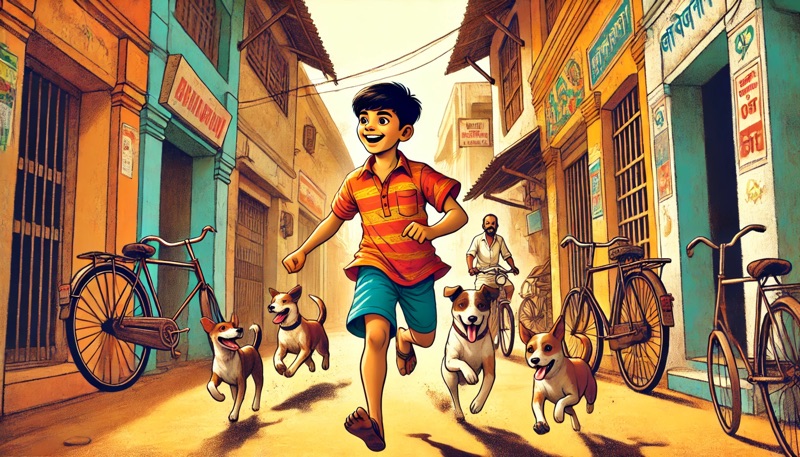The Boy Who Speaks Without Words
Disclaimer: Sharing personal stories of meet cute encounters with differently abled children from my regular life.
Stepping Beyond Labels: A Different Conversation Today

Today, I find myself moving slightly away from autism to share something different—but just as important. It’s a story about communication, about being heard in ways that don’t always fit the world’s expectations. It’s about a child whose words aren’t spoken but are just as powerful, and how, in learning to listen to him, I’ve come to see communication in a whole new light.
Sometimes, understanding isn’t about the words we say—it’s about the connections we choose to make.
The Boy Who Speaks Without Words
Every morning, as I step out for a walk with my dog, the streets slowly come to life. The tea stalls begin their rhythmic clatter, shop shutters roll open, and the occasional cyclist wobbles past. But what I look forward to most is a little gang of children gathered in a narrow gully, waiting—not for me exactly, but for the furry paws at my side.
Among them is a boy who doesn’t speak, at least not in words. But he loves to talk—or should I say, express?
At first, I’m not sure if he understands me. I greet him like I do the others, with a smile, a wave, maybe a casual remark. Instead of answering in words, he responds with gestures, animated expressions, and noises in a silent language that is entirely his own. He points at things excitedly—the stray dog across the street, the man on the bicycle, the bird perched on a wire—each movement deliberate, as if telling me a story I have to piece together.
And so, I start listening.
His friends, a noisy, giggling bunch, are shorter than him, naughtier than him, and definitely more talkative. They call out to me, always a few steps behind him, yelling:
“Didi! Didi! Doggie! Doggie!”
Half-shouting, half-laughing, always eager to meet my dog but never quite brave enough. My dog, a big, friendly, overly enthusiastic creature, bounces toward them in pure joy, tail wagging wildly, eager to say hello. And the kids, despite their excitement, always retreat—laughing, squealing, torn between fascination and fear.
But the boy—the one who speaks without words—is different.
He doesn’t shriek or jump back. Instead, he steps forward, just a little closer than the others, eyes shining with curiosity. He makes grand, dramatic gestures, as if declaring,
“Today is the day I’ll finally pet the dog!”
Then, at the last moment, he grins slyly, shakes his head, and retreats with a mischievous sparkle in his eyes. He is the silent instigator, the one who dares his friends to be brave, who signs something quick and clever that makes them all burst into laughter.
Over time, our morning encounters become a ritual. I point out other dogs—ones barking from balconies, others trotting alongside their owners. The children chatter excitedly, mixing half-formed words with their own brand of gibberish, and the boy signs along, adding his own silent commentary. We don’t always understand each other perfectly, but somehow, it doesn’t matter.
Every morning, he waves excitedly when he sees me, and I wave back.
What surprises me, though, is how surprising this is to others.
Adults who pass by sometimes stop and watch, curiosity flickering across their faces. Later, they ask me—what are we talking about? Do I actually understand him? And then, almost always, they brush it off.
“Paagol chele ekta, oi jaane ki boley.”
(“He’s a crazy kid, he only understands what he says.”)
But I don’t see anything crazy about him. I see a boy—curious, playful, full of thoughts and feelings just like anyone else. A boy who, fortunately or unfortunately, does not have speech, so he creates his own way of speaking. But because it doesn’t fit into what people expect, it is dismissed. He is dismissed.
And I wonder—what does the world look like to him? A world where everyone assumes he has nothing to say, simply because they don’t know how to listen.
I don’t know where he lives. I’m sure it’s somewhere in the locality, but I’ve never asked. Maybe because my conversations with him exist in the moment, unburdened by deeper questions. Maybe because I don’t yet have the courage—or the resources—to step further, to find out if he gets the education he deserves.
But the thought lingers.
Maybe one day, I’ll talk to the neighbors. Maybe I’ll find out if he goes to school, if there’s something more I can do. Because he is a curious little boy. And because in a city that never stops talking, he deserves to be heard too.
I don’t know what made him choose me. Maybe it was the dog, maybe the familiarity of my daily walks, or maybe just the simple joy of someone willing to talk in a way he can understand. But I do know this: words aren’t the only way to speak, and some bonds don’t need translation.
Why do you think people are quick to dismiss those who communicate differently? How can we become better listeners?
Comments
Post a Comment